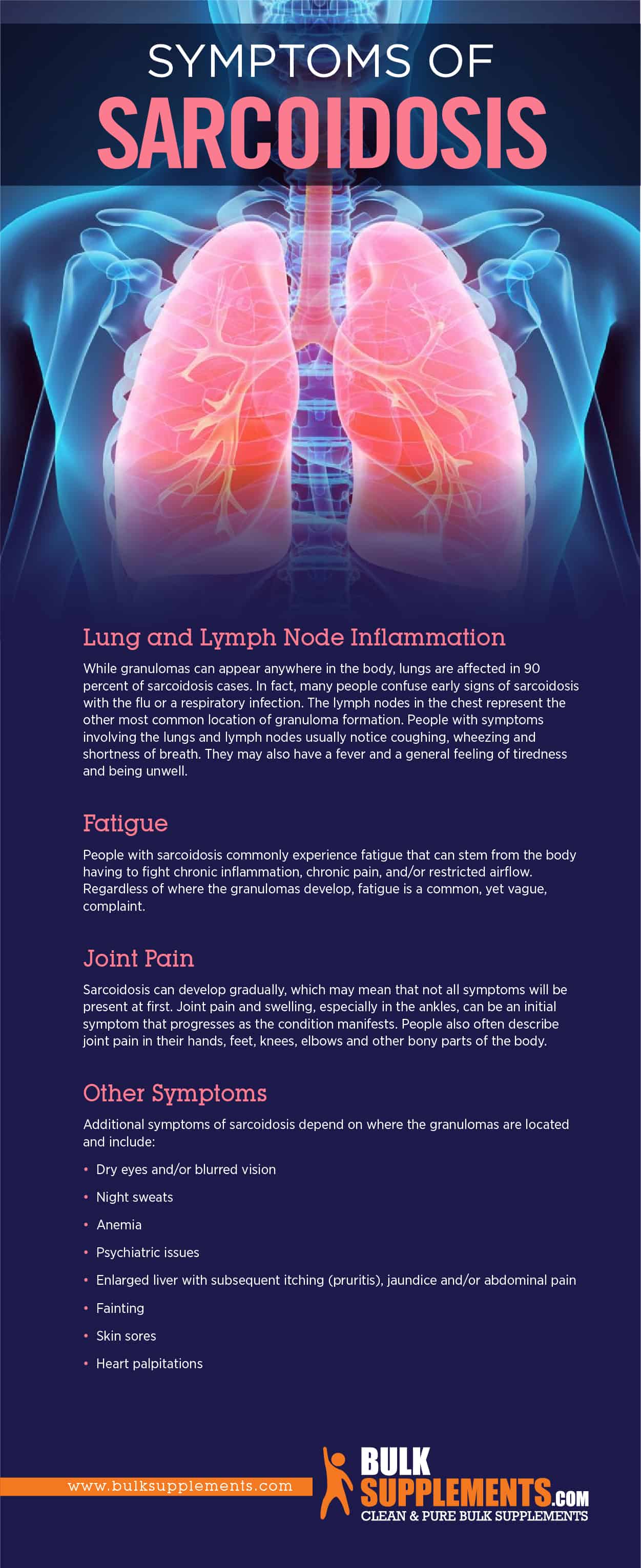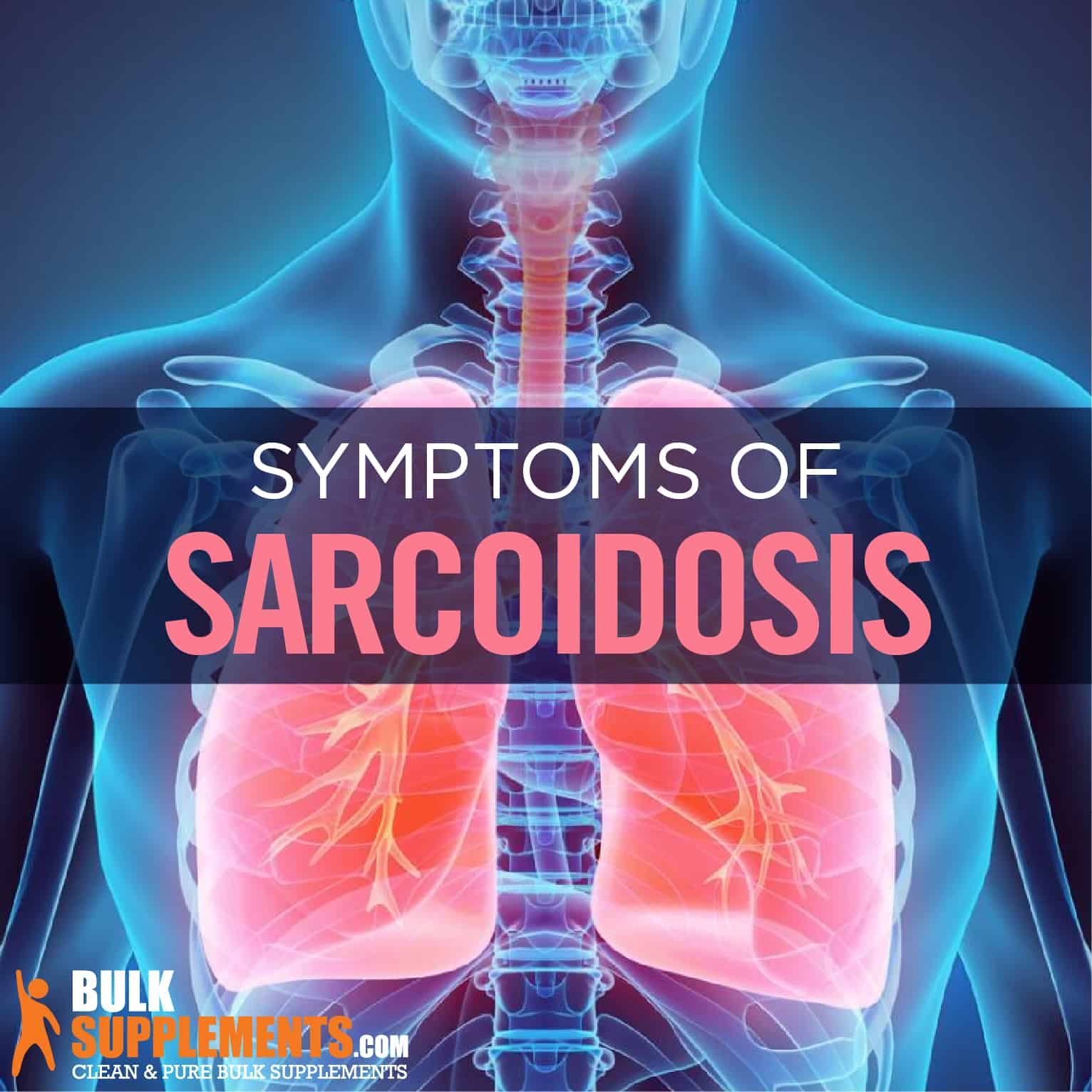What is Sarcoidosis?
Sarcoidosis is a rare condition characterized by the growth of granulomas (lumps that develop on organs caused by inflammation) (x). They typically develop on the lungs and lymph nodes, but can be present anywhere in the body including the eyes, skin, heart and other organs (x). Granulomas can come and go or can remain in the body long-term. Sarcoidosis becomes chronic when a person has granulomas for 2-5 years (x).
Fortunately, many people with mild sarcoidosis have symptoms that don’t interfere with daily life. Severe and chronic cases, however, can cause fibrosis and organ damage. People with sarcoidosis complain of swollen and painful joints, tender skin and discomfort in the hands, feet or other body parts (x).
Currently, an estimated 1.2 million people worldwide live with the condition. While anyone can be affected, it’s more common in people with African and Scandinavian ancestry (x, x). Researchers still don’t understand what causes it and accurate diagnosis remains a challenge. As a result, developing effective treatments has also been difficult (x).
Sarcoidosis Symptoms
Symptoms vary widely in their severity from one person to the next. Some people with sarcoidosis never notice any symptoms, while others may be debilitated. In addition, symptoms associated with sarcoidosis can be vague and apply to a number of different ailments.
Lung and Lymph Node Inflammation
While granulomas can appear anywhere in the body, lungs are affected in 90 percent of sarcoidosis cases (x). In fact, many people confuse early signs of sarcoidosis with the flu or a respiratory infection. The lymph nodes in the chest represent the other most common location of granuloma formation. People with symptoms involving the lungs and lymph nodes usually notice coughing, wheezing and shortness of breath. They may also have a fever and a general feeling of tiredness and being unwell (x).
Fatigue
People with sarcoidosis commonly experience fatigue that can stem from the body having to fight chronic inflammation, chronic pain, and/or restricted airflow. Regardless of where the granulomas develop, fatigue is a common, yet vague, complaint (x).
Joint Pain
Sarcoidosis can develop gradually, which may mean that not all symptoms will be present at first. Joint pain and swelling, especially in the ankles, can be an initial symptom that progresses as the condition manifests. People also often describe joint pain in their hands, feet, knees, elbows and other bony parts of the body (x).
Other Symptoms
Additional symptoms of sarcoidosis depend on where the granulomas are located and include (x):
- Dry eyes and/or blurred vision
- Night sweats
- Anemia
- Psychiatric issues
- Enlarged liver with subsequent itching (pruritis), jaundice and/or abdominal pain
- Fainting
- Skin sores
- Heart palpitations

Sarcoidosis Causes
Researchers still aren’t sure what causes sarcoidosis, but some believe that it might be caused by a genetic predisposition to the disease combined with exposure to something in the environment. Science hasn’t identified a specific gene, nor a specific environmental factor. Studies remain ongoing (x).
While the cause remains unknown, some people have a greater risk of developing the condition (x):
- Those of African or Scandinavian decent
- Women
- People ages 55 and over
- Those with occupational hazards who are more likely to breathe in dust, mold, pesticides, or other airborne particles
Sarcoidosis Remedies and Supplements
Medical treatment for sarcoidosis varies depending on the severity of the condition and the areas it affects on an individual. For example, if someone isn’t experiencing problematic symptoms, he or she may not require treatment at all. On the other hand, those with chronic, advanced cases often need complex, individualized treatment plans. However, corticosteroid therapy is usually the first treatment option for people with both acute and chronic forms of sarcoidosis (x).
Sarcoidosis patients often seek out natural therapies like supplements to reduce inflammation or complement medication. It’s important to check with your doctor before starting any supplements.
Turmeric
Studies show that turmeric reduces inflammation, a main feature of sarcoidosis (x). While no studies exist yet on its specific effect on the disease, many people with sarcoidosis use turmeric alone or in combination with medication to help manage their inflammation. Turmeric appears safe for people to use, although checking with your doctor first is still important (x). As a supplement, take curcumin 95% natural turmeric extract powder in one dose of 1,000 mg or less per day, depending on intended effect or as directed by a physician.
Melatonin
A 2006 study suggested that melatonin can improve symptoms of sarcoidosis. It helps to regulate the immune system and as a result, some people experienced improvement in levels of inflammation after using it for 24 months. In this study, no side effects were reported (x). Pure melatonin powder can be taken in a single serving size between 1 mg and 3 mg before bedtime, or as directed by your doctor.
Because of its potency and potential for overdose, this product should only be measured with a milligram scale. Do not exceed the recommended serving size. Use responsibly.
Quercetin
Quercetin, an antioxidant, reduces oxidative stress and inflammation in people with sarcoidosis (x). As a dietary supplement, take 250 mg to 500 mg once or twice daily, or as directed by physician.
Diet
A “healthy” diet (which differs according to the needs of an individual) goes a long way in promoting overall health. As a result, eating well in general can improve quality of life and minimize health complications of all kinds. Diet tips specific to people with sarcoidosis include:
- Be mindful of calcium intake. Up to 63 percent of people with the condition have an unusually high level of calcium in their bodies. Only a laboratory test can determine someone’s calcium levels, but avoiding high-calcium foods like dairy products may be appropriate for some people. Since vitamin D3 promotes absorption of calcium, this supplement is also discouraged (x).
- Eat antioxidant-rich foods. As a rule, plant-based foods generally contain higher amounts of antioxidants than meats or grains (x). Berries, apples, legumes, tomatoes, green leafy vegetables and many herbs and spices offer lots of antioxidants (x).
- Avoid inflammatory foods such as refined grains, hydrogenated oils, processed food and sugar (x).
The Bottom Line
The effects of sarcoidosis differ from one person to the next. No one is quite sure why some people get it and others don’t, and treatment options don’t always meet the needs of patients. This condition remains a challenge for both patients and doctors. It can be temporary or chronic and go nearly unnoticed or be debilitating. As the granulomas caused by the condition often affect the lungs and lymph nodes, early signs resemble the flu and a respiratory infection. Prompt and proper diagnosis can help people get the right treatment and live their fullest lives. Drugs like corticosteroids can reduce inflammation. Diet and supplements can also be used to manage symptoms.


